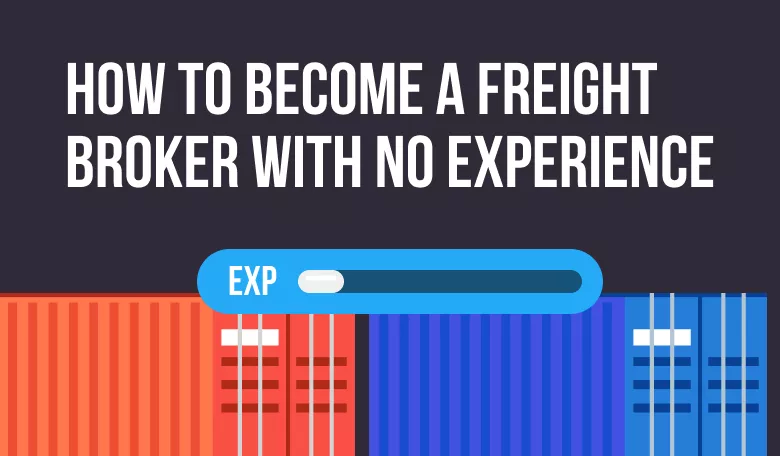How to Become a Freight Broker With No Experience

Freight brokers are valuable players in the freight industry and the supply chain when it comes to arranging logistics. They can help companies find the right shippers to transport goods in a way that meets both parties' needs. Becoming a freight broker takes some work.
For many people, the invested time and money are worth the job opportunities in an ever-growing field as the demand for shipping goods increases. This article will help explain what a freight broker is, required qualifications, tips for becoming one without any experience and the cost to become a freight broker. By the end of the article, you can better determine if becoming a freight broker is worth it and right for you.
What Is a Freight Broker?
A freight broker is a person who serves the logistics industry and cargo industry by assisting in organizing shipments. The broker selects shippers based on the needs of the cargo company. For example, if a cargo load must be sent quickly, a broker chooses a shipping or trucking company that has the ability to meet the time deadline. While brokers arrange services, they do not take physical possession of cargo. Some may work from home or in an office.
The broker is a middleman for both companies and facilitates good communication to ensure that needs are met. Brokers also keep track of movement updates as loads are transported. Additionally, they may negotiate pricing, develop marketing strategies, find new clients, handle paperwork, and respond to customer inquiries.
What do You Need to Become a Freight Broker?
Unlike many careers, there are no freight broker training or educational requirements. You may find a freight broker training course online that you can take independently if you wish. Although industry experience is helpful, it is not essential. Some people may start as a dispatcher or in another entry-level position in the shipping industry.
Today, there are also freight brokering software programs that have helpful and educational features. If possible, it still helps to try to work in the freight industry for a while to gain insights and make sense of how a freight brokerage company works. A freight agent working for another company may gain experience and learn enough to start a successful freight broker business.
Licensing Requirements
There are legal and licensing requirements to become a freight broker and start a freight brokerage business. After you decide how you want to register your freight broker business, you must license it. Broker authority is a key challenge in navigating legal and licensing requirements. There is an application fee you must pay and submit to the Federal Motor Carrier Safety Administration for operating authority. This is for the USDOT number and freight broker license.
Only a licensed freight broker can arrange shipments legally, which is why this step is critical. Following a review and issuance of an MC number, you have the first step completed. However, there are still a few other requirements before you can start contacting shipping companies and start running your own business. In order to accept paperwork on behalf of transportation or shipping companies in states they are allowed to operate, freight brokers must file a Form BOC-3 with the FMCSA to serve as a process agent.
Surety Bond and Insurance Requirements
The FMCSA requires freight brokers in the transportation industry to file a Form BMC-84, which is for a surety bond. The freight broker bond must meet the requirements outlined by the FMCSA to be satisfactory.
A freight broker agent must also have insurance. Your freight broker company will need a general liability insurance policy. As you start your own brokerage, it is also prudent to have contingent cargo insurance. This is helpful if contracted truckers you work with have coverage issues. You can protect yourself further with a cargo policy that has provisions for environmental, property and bodily damage. After all these items are in order, you are ready to be a cargo transportation broker.
Tips for Becoming a Freight Broker With No Experience
Since there are no standardized training programs, it is important to have some business experience or know how to start a business correctly. It helps to work with an attorney who specializes in business law to understand the steps and how to protect yourself from potential legal troubles throughout the entire process. You can also look for a freight broker training school to further your education.
Develop a Business Plan
This is the starting point for every successful business. It outlines your key objectives or goals and how you plan to accomplish them. A business plan shows how you will make money. You should also conduct a SWOT analysis. Spend some time researching how to accomplish this step to identify your strengths, weaknesses, opportunities and threats. This can help you develop realistic expectations and can benefit everything from your social media strategy to deciding which types of truck drivers to work with when you start.
Complete Legal Requirements and Prepare Your Network
Earlier, you learned the main legal requirements to become a freight truck broker. Once you have your business plan in place, start working on those. If you need to hire people, start planning on what you want to look for in employees while you do that. Also, spend this time connecting with other freight agents, logistics companies and cargo companies. It is important to start building a network.
Find Funding
If you do not have capital of your own to support your new business, look for funding. You may want to start with a line of credit or business credit cards. Do not aim for high-level growth immediately. You can start small and grow as you are financially able. Today, there are also alternative funding options and small business loans.
Get Comfortable With Load Boards
Load boards are convenient online directories of carrier equipment, cargo company requirements and more. Transportation brokers use them for matching the right truckers with cargo companies.
How Much Does It Cost to Become a Freight Broker?
The cost to become a freight broker can vary between $4,000 and $10,000 in most cases. You have insurance, bond, licensing, legal, marketing and other costs. For some brokers, the startup cost may include hiring employees or outsourcing tasks as well.
Is Becoming a Freight Broker Worth It?
Do freight brokers make a lot of money? This is a key factor for a person deciding whether or not to become a freight transportation broker. Freight broker salary can vary. In 2021, the Bureau of Labor Statistics reported that the average annual salary for cargo and freight agents was a little over $48,000. If you enjoy the work and are diligent in running a business properly, it can be well worth the investment.
If becoming a freight broker sounds like something you want to do, check out our Freight Broker Complete Compliance Guide.
- Fast and Secure Application
- Nationwide Coverage
- Approval in Minutes
- Money Back Guarantee
Recommended Articles
- Fast and Secure Application
- Nationwide Coverage
- Approval in Minutes
- Money Back Guarantee
- Image

- Image

- Image

Lance Surety Bond Associates, Inc. is a surety bond agency based out of southeastern Pennsylvania that is able to write all surety bond types in all 50 states. We are dedicated to servicing all of our customers' surety bonding needs throughout the country and guarantee competitive rates, timely responses, and unparalleled customer service.







